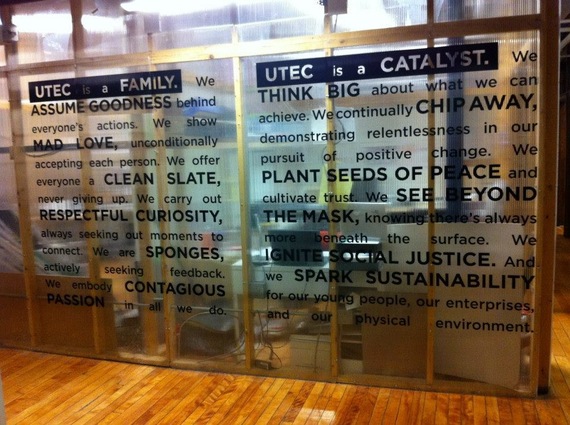We are shockingly comfortable with hate and fear as core elements of our public policy discussions today. Carpet-bombing Ted "I don't know if sand can glow in the dark, but we're going to find out" Cruz and Donald "total and complete shutdown of Muslims entering the United States" Trump lead in Iowa and New Hampshire with only days until the caucuses and primary.
The problem with such hate and mistrust is they limit our collective imagination, and therefore place pernicious boundaries around our solutions. The result can be public policy that lacks compassion and fails to focus on inherent strengths, or even worse, is punitive and oppressive. From debilitating asset limits placed on "welfare queens," to sentencing guidelines that incarcerate black men en masse, to the U.S. House banning even Syrian refugee children from entering the U.S., our laws are littered with hate and fear and the failures of public policy they produce.
If being hateful, or at least fearful, is core to our public discussion, then love should be, too. Every ying deserves its yang, especially one that works. After years of working on poverty and inequality, I know that love works. Here are just two examples.
United Teen Equality Center (UTEC) in Lowell, Mass., does effective work with disenfranchised youth who are "proven risk." UTEC catches these young people as they appear to be falling and supports them through GEDs, job training, work in one of the UTEC businesses, and eventually successful employment in the community.
UTEC's building is at the heart of its work. One of its most striking features is its "values" wall, a sort of glass sculpture espousing what the organization believes. It opens with the following.
UTEC is a family. We assume goodness behind everyone's actions. We show mad love, unconditionally accepting each person. We offer everyone a clean slate, never giving up.
UTEC's mattress recycling and catering businesses might transition youth to jobs, but it's the love-based approach that attracts the youth in the first place, and keeps them in the program.
InnerCity Weightlifting (ICW) in Boston is rooted in love, too. You might not know it at first glance -- a weight room where gang-involved young men come first to train, then to become trainers -- but really to choose a new way of life. You might not know it even after hearing about ICW's measurable impact with young men in a category so extreme that most organizations don't work with them.
Several years ago, however, I attended a roundtable for philanthropists that featured InnerCity Weightlifting. The presenters were young men in the program and a man who works as a trainer and guide for these younger versions of himself. A local foundation representative asked the trainer -- who had spent most of his own adult life in prison -- what made ICW work. He was quick and unabashed with his answer, "Love."
We can incorporate such love into public policy. What would that look like? Poverty would become part of the national discussion, alongside the middle class, as when Speaker of the House Paul Ryan and the Jack Kemp Foundation hosted a recent poverty summit. When we create opportunities for the marginalized, they would take a lead in designing approaches, outcome measures and targets, as is the practice of the Family Independence Initiative, whose founder won a MacArthur genius award and whose members regularly bring themselves out of poverty.
It would look like a social safety net that allows people to build assets and savings, because their aspirations matter, and because "we assume goodness behind everyone's actions." That doesn't mean we forgo accountability. We just give up a hefty layer of judgment, recognizing that the truth is, anyone can be born behind the eight ball.
It also would look like forgiveness and second chances. A criminal record wouldn't destroy your economic future. The U.S. wouldn't have 38,000 provisions on the books stripping people who were incarcerated but served their time of basic citizens' rights. We would use restorative justice alongside incarceration. We would invest in drug treatment the way we invest in drug wars. When youth aged out of foster care at 18, they would not be left alone to fend for themselves in this scary world.
Towards the end of his recent State of the Union address, President Obama invoked the spirit of Dr. Martin Luther King, Jr. when he promised to walk alongside people offering hope. "I'll be right there with you as a citizen - inspired by those voices... [that] Dr. King believed would have the final word -- voices of unarmed truth and unconditional love."
Amen to the voices of unconditional love. Love works, and it has a legitimate place in public debate and public policy today. That's the unarmed truth, and we could make tremendous change on a tremendous scale if we had the courage to embrace it.

